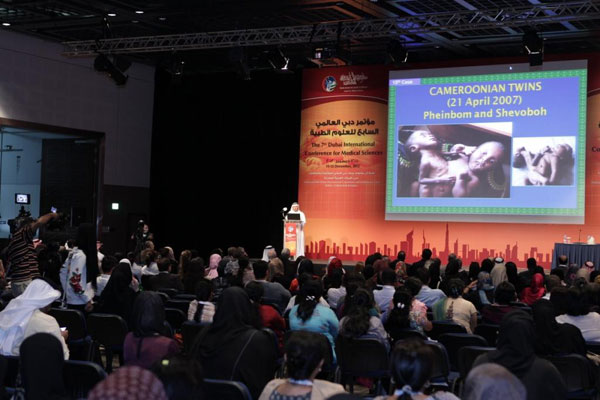Hamdan Medical Award opens the 7th Dubai International Conference for Medical Sciences
11 December 2012
In conjunction with the Award Ceremony, Sheikh Hamdan bin Rashid al Maktoum Award for Medical Sciences (HMA) opened today morning the 7th Dubai international conference for medical sciences on Neonatal Medicine, Fetal Medicine, Nutrition in Infancy and Inborn Errors of Metabolism at Al Maktoum Hall, Dubai International Conventions and Exhibitions Centre with the participation of 1800 doctors, students, and professionals working in the Health Care Sector.
Prof. Youssuf AbdulRazzaq, chairman of the scientific committee of the Award, inaugurated the conference with a welcome speech reviewed the 2-days scientific program of the conference. Then, H.E. Dr. Abdullah AL Rabeeah, KSA Minister of Health, delivered a keynote lecture about his experience with conjoined twins in Saudi Arabia between 1990 and 2012 which included managing sixty-nine (69) sets of conjoined twins that have been reviewed in the Kingdom of Saudi Arabia under the National Program for Conjoined Twins sponsored by the Custodian of the Two Holy Mosques, King Abdullah bin Abdulaziz.
Then, the 1st session of the conference on Neonatal Medicine started with a lecture by Prof. Jeffrey Whitsett, the winner of Grand Hamdan International Award, USA, entitled "The molecular basis of pulmonary surfactant: Lessons from Newborn Infants". Through the lecture, he provided an intensive coverage of his studies on the structure and function of the Surfactant Proteins (SP-A, SP-B, SP-C, SP-D) with the genes encoding them and the genes regulating surfactant lipid production and recycling. Also, he spoke about the data he produced and helped to acquire the tools and strategies for the diagnosis and treatment for many idiopathic pulmonary diseases.
Prof. Ola Saugstad, Norway, gave a talk on the subject of neonatal resuscitation in the context of optimizing oxygen saturation. He provided a detailed account on a myriad of studies that recommend using air instead of oxygen for newborn resuscitation and the considerable reduction in mortality that can be consequently achieved.
Also, Prof. Denis Azzopardi, UK, presented his data on neonatal encephalopathies and the use of prolonged moderate cooling in management. He also showed the latest recommendations about exploring a combination of therapies along with hypothermia.
As for the lecture by Prof. Anne Greenough, UK, it focused on optimizing neonatal ventilation in the context of bronchopulmonary dysplasia which is a common adverse outcome of very premature birth. She showed the main targets of intervention along with reported outcomes and recommendations.
Then, the 2nd session of the conference on Fetal Medicine started with a lecture by Prof. Nicholas Wald, the winner of Hamdan Award for Medical Research Excellence, UK. Prof. Wald's lecture was based on his long experience with using vitamins to prevent neural tube defects such as spina bifida, Starting from epidemiological data and finishing with the preventive interventions that were adopted by many countries around the world. Prof. Wald reviewed his journey that contributed to saving the lives of a large number of infants in many countries.
Prof. Yves Ville, France, gave a detailed account about the practice of fetal interventions especially fetal surgery in terms of developing protocols and various challenges that accompany such interventions. Also, Prof. John Simpson, UK, spoke about the management of antenatally diagnosed congenital heart disease. He offered a valuable opportunity to discuss the latest data regarding reduced mortality and morbidity due to diagnosing congenital heart diseases during fetal life with newer screening techniques.
Finally, Prof. Baski Thilaganathan, UK, presented a highly informative account about preeclampsia and maternal cardiac function. He introduced a number of echocardiographic indices that can help in the detection and management of these cases.
It is worthy to mention that within the activities of the 7th Dubai International Conference for Medical Sciences, HMA organized yesterday a series of workshops on Neonatal Resuscitation, Antenatal Detection of Congenital Heart Diseases, Successful Weaning and Extubation, Emergency Management of Inborn Errors of Metabolism in the Newborn Period, Treatment of Fetal Infection, Epigenetics, Biochemistry of the Newborn and Pre-mature Infant Implications for Treatment and Management, Multiple Pregnancies, Evidence Base for Various Neonatal Screening Programs and Nutritional Support of the Extremely Low Birth Weight Neonate.

